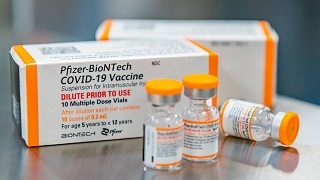BREAKING! Israel Study Published In British Medical Journal Reveals Gradual Increase In COVID Infection Risk 90 Days After Second Pfizer Vaccine Dose!
A new study by researchers from Leumit Health Services-Israel, Ariel University, Ariel-Israel, Tel Aviv University-Israel, Barzilai University Medical Centre and also involving experts from the National Cancer Institute, Bethesda-USA (Why the U.S. National Cancer Institute was involved is yet another interesting aspect that we will be covering in a future article!) has found a gradual increase in the risk of COVID-19 infection from 90 days after receiving a second dose of the Pfizer-BioNTech vaccine.

In the study, 83,057 adults received an RT-PCR test for SARS-CoV-2 during the study period and 9.6% had a positive result. Time elapsed since the vaccine injection was significantly longer in individuals who tested positive (P<0.001). Adjusted odds ratio for infection at time intervals >90 days since vaccination were significantly increased compared with the reference of <90 days: 2.37 (95% confidence interval 1.67 to 3.36) for 90-119 days, 2.66 (1.94 to 3.66) for 120-149 days, 2.82 (2.07 to 3.84) for 150-179 days, and 2.82 (2.07 to 3.85) for ≥180 days (P<0.001 for each 30 day interval).
The study findings showed that
in this large population of adults tested for SARS-CoV-2 by RT-PCR after two doses of mRNA BNT162b2 vaccine, a gradual increase in the risk of infection was seen for individuals who received their second vaccine dose after at least 90 days.
The study findings were published in the peer reviewed British Medical Journal.
https://www.bmj.com/content/375/bmj-2021-067873
Israel was one of the first countries to roll out a large scale COVID-19 vaccination campaign in December 2020, but which has seen a resurgence of infections since June 2021.
The study findings confirm that the Pfizer-BioNTech vaccine provided excellent protection in the initial weeks after vaccination, but suggest that protection wanes for some individuals with time.
Currently across the world, large scale COVID-19 vaccination campaigns are helping to control the spread of the virus, but even in countries with high vaccination rates, breakthrough infections can occur, which medical researchers think is due to a gradual loss of immunity over time.
According to the study the team, examining the time elapsed since vaccination and risk of infection could provide important clues about the need for a third injection and its preferred timing.
In order to do this, the study team examined electronic health records for 80,057 adults (average age 44 years) who received a PCR test at least three weeks after their second injection, and had no evidence of previous COVID-19 infection.
It was found that of these 80,057 participants, 7,973 (9.6%) had a positive test result. These individuals were then matched to negative controls of the same age and ethnic group who were tested in the same week.
Importantly the rate of positive results increased with time elapsed since a second dose. For example, across all age groups 1.3% of participants tested positive 21-89 days after a second dose, but this increased to 2.4% after 90-119 days; 4.6% after 120-149 days; 10.3% after 150-179 days; and 15.5% after 180 days or more.
And after taking account of other potentially influential factors, the study team found a signi
ficantly increased risk of infection with time elapsed since a second dose.
Interestingly compared with the initial 90 days after a second dose, the risk of infection across all age groups was 2.37-fold higher after 90-119 days; 2.66-fold higher after 120-149 days; 2.82-fold higher after 150-179 days; and 2.82-fold higher after 180 days or more.
The study team acknowledge that interpretation of their findings is limited by the observational design, and they cannot rule out the possibility that other unmeasured factors such as household size, population density, or virus strain may have had an effect.
This was however a large study of people who all received the same vaccine, and the study team was able to carry out detailed analysis of the data, suggesting that the results are robust.
Hence, the team concludes that in individuals who received two doses of the Pfizer-BioNTech vaccine, protection seemed to decrease over time, and the risk of breakthrough infection increased progressively compared with the protection provided during the initial 90 days.
The study findings suggest that consideration of a third vaccine dose might be warranted, they add.
But it will also be interesting to study how long is the protection offered by the third dose will last and also whether the third dose would cause any adverse effects to the immunity system or any other health risk.
Thailand
Medical News would also like to point out this study findings contradict earlier studies and statements given by various so called ‘experts’ and authorities that the second dose provides protection up to six months!
For the latest research on
COVID-19 Vaccines, keep on logging to Thailand Medical News.
